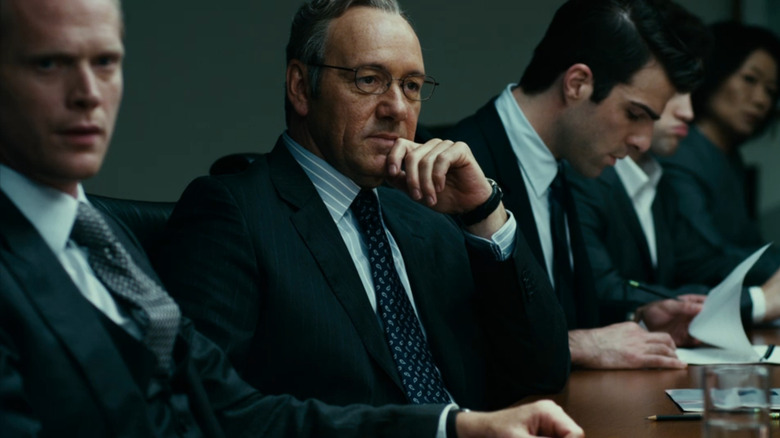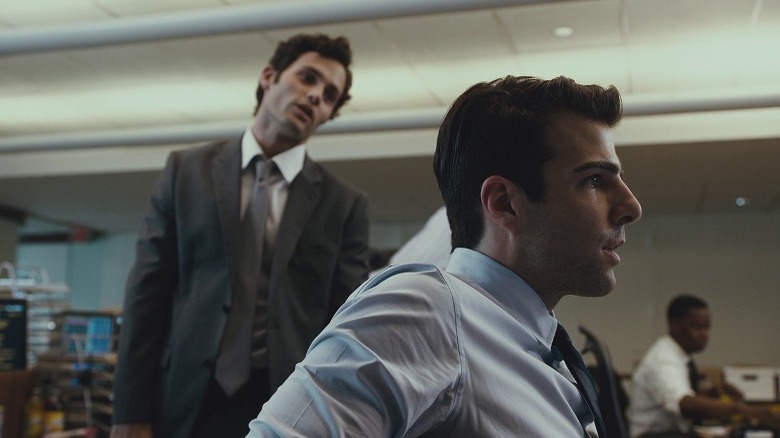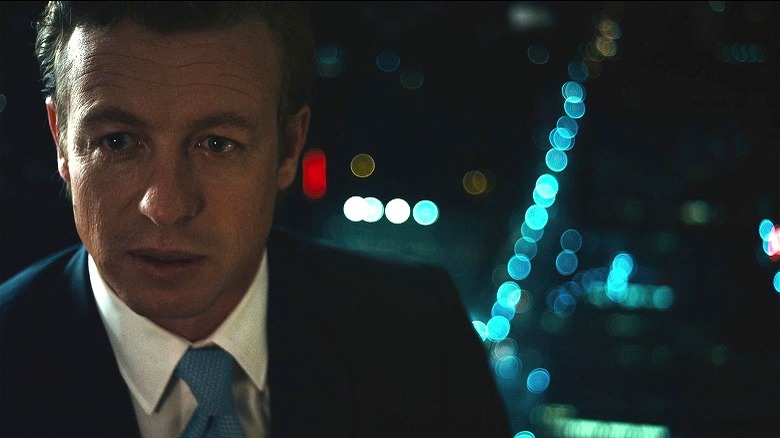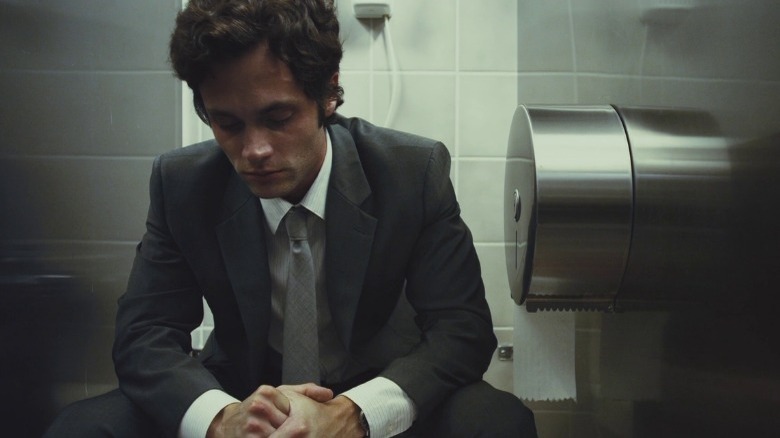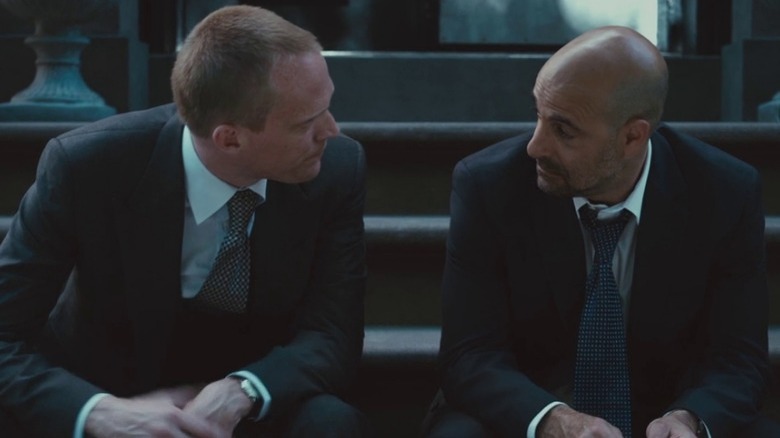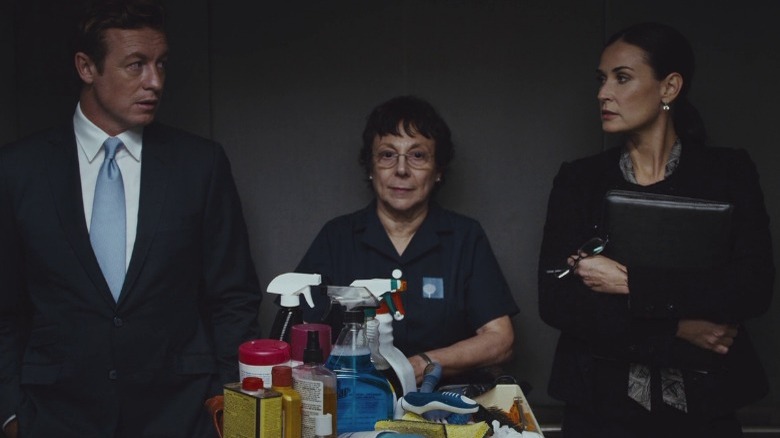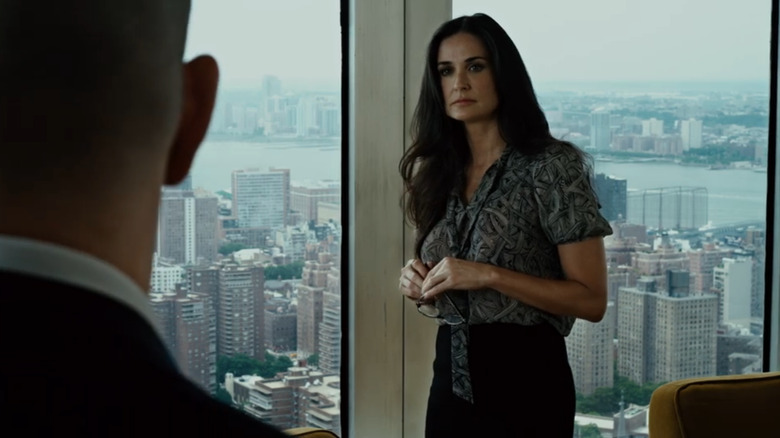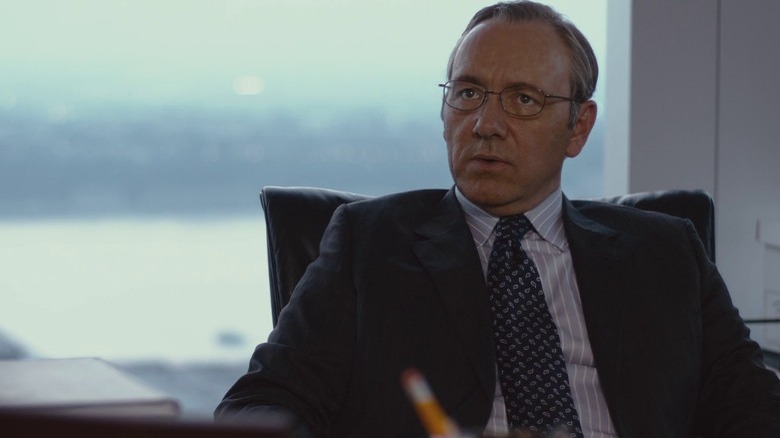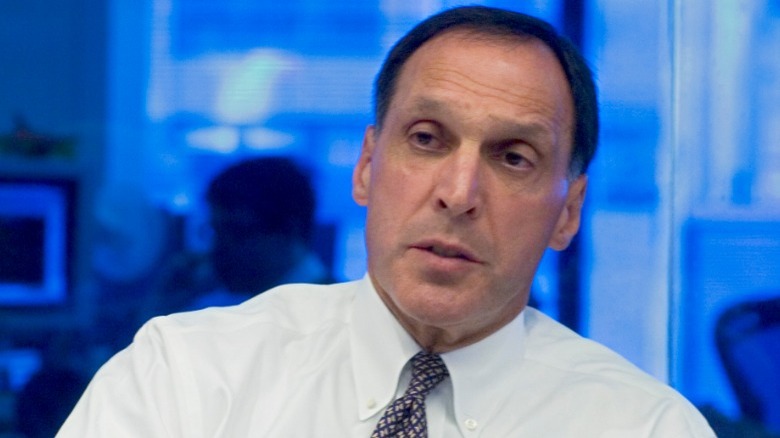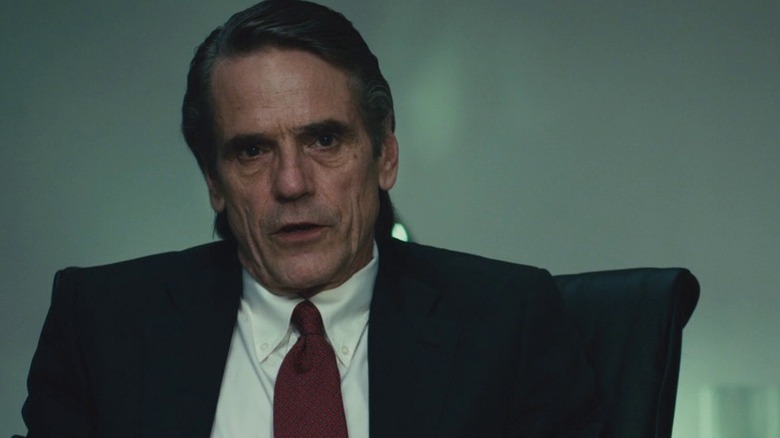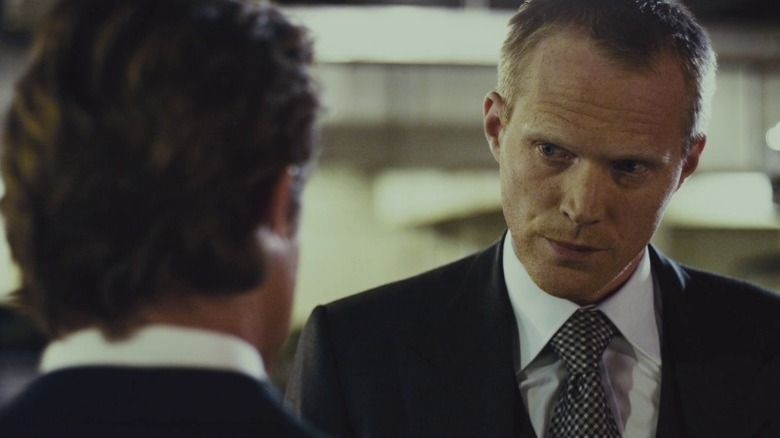The Ending Of Margin Call Explained
The 2011 financial thriller "Margin Call” explores the origins of the 2007 to 2009 financial crisis. Caused in large part by the boom-and-bust of the U.S. housing market in the early-to-mid 2000s, as well as investment banks selling mortgage-backed securities, the "Great Recession" sank the world into the deepest economic catastrophe since the Great Depression from the 1920s to the 1940s. While Wall Street tumbled, Main Street reeled, with trillions of dollars in economic growth lost and millions losing not only their homes, but their jobs. The echoes of the crisis reverberated through people's lives for years; some never recovered.
"Margin Call" unfolds at an unnamed investment bank where, during a round of layoffs, a young analyst (Zachary Quinto) discovers the firm's risky trading has potentially led not only to the organization's demise, but to a potential market collapse. Over the course of 24 hours, the firm must decide how to proceed knowing there is no going back. "Margin Call" is a taut Wall Street drama that's not just about the numbers — it's also a story of the very human choices and circumstances that led to this economic and societal catastrophe. The conclusion of the film can't be understood by mere spreadsheets, and its characters' moral ambiguities live outside a financial algorithm. So let's explain the ending of "Margin Call" and explore how small choices can lead to big trouble.
What you need to remember about the plot of Margin Call
In "Margin Call," it's 2008 and a heavy round of layoffs is taking place at an unnamed investment bank. Head of risk management Eric Dale (Stanley Tucci) is fired, and as he's escorted from the building, Dale passes a flash drive of his work to young associate, Peter Sullivan (Zachary Quinto). He asks Sullivan to finish the work located on the drive, but Dale warns Sullivan to "be careful." Completing Dale's work that night, Sullivan discovers the bank is on an inevitable path to failure due to the firm's over-leveraged assets.
Sullivan, along with analyst Seth Bregman (Penn Badgley), trader Will Emerson (Paul Bettany), and Emerson's boss, Sam Rogers (Kevin Spacey), attend an emergency meeting with an executive team that includes Jeremy Cohen (Simon Baker) and Chief Risk Management Officer Sarah Robertson (Demi Moore). Cohen and Robertson conclude Sullivan's report checks out, but it's not a startling revelation to the higher-ups. Rather, it serves as a receipt for their knowingly risky behavior.
With the bank on the brink of ruin, CEO John Tuld (Jeremy Irons) is summoned to the office, and it's determined that a fire sale of the toxic assets will save the company. The liquidation sale risks the bank's industry reputation, the careers of its employees, and broader market stability. Tuld ultimately decides it's better for the firm to be the first to sell in order to survive a seemingly inevitable collapse of the financial market.
What happens at the end of Margin Call
At the end of the film, the firm moves forward with the fire sale. Despite his trepidations and knowing that it will destroy the careers of many of his employees, Rogers rallies his traders, and the firm successfully liquidates many of its assets. Many traders lose their jobs, including Bregman. Emerson, whose trading prowess we follow as the fire sale unfolds, makes the cut. Sullivan, a Ph.D.-level rocket scientist who is ambivalent about working at the firm, is promoted for his efforts and is now seen as a valuable asset to the firm's recovery.
The firm's management team doesn't fare much better. Dale, who was unceremoniously fired the day before, is all but forced back to work, his severance and benefits held hostage unless he comes back. His work uncovered the crisis, and the firm wants to keep him close. Robertson is pushed out by Tuld, made to publicly take responsibility for the firm's failure, but Cohen stays. While Rogers successfully commandeers the fire sale, he wants out of his job. He confronts Tuld, asking him how they messed up so badly. Tuld sees the day's events as just another moment in historic market volatility. For Tuld, money is merely an imaginary concept that keeps civilization in order. His firm survives the day, and Tuld is already focused on future potential profits from the downturn. Tuld wants Rogers to stay. Disillusioned but in need of the money, Rogers continues working at the firm.
Greed and success go hand in hand
At the firm, success depends on employees' ability to embrace their own greed and selfishness. Some, like Tuld and Emerson, rationalize their greed as a reaction to outside systems. Tuld believes that the markets can't be controlled, one simply reacts to them. Through this twisted logic, he is able to absolve himself of personal responsibility for the societal misery brought on by his choices. Tuld believes there are always winners and losers.
Emerson, meanwhile, justifies his work as merely giving people what they want. If they want to afford big houses and fancy cars, Emerson thinks, he's the one who moves the money to make it happen. Both men understand how their choices affect society but show little concern for any negative outcomes. Because in their minds, if they're not holding power or making money, then someone else will.
For other characters, their greed manifests in acts of quiet self-interest. When Rogers leaves the room when Cohen and Robertson discuss Sullivan's findings, he's asked to stay and possibly help in their predicament. Instead, he leaves, telling them that willful ignorance about the hard data and problems facing the company is how he's been at the firm so long. For Rogers, ignorance is not only bliss — it's a survival tactic. To Sullivan, his work at the firm is just numbers, and he's only there because of the good pay. Ironically, it's the openly money-obsessed Bregman, who, only when faced with his inevitable firing, thinks outside of himself and contemplates how the firm's actions will hurt regular people.
Why build bridges when investment banking pays so much better?
Many of the firm's employees didn't start their careers in finance, but enticed by the enormous payouts of investment banking, they ditched their more humble and noble work for Wall Street. Before joining the firm, Dale worked as an engineer. He tells Emerson about how he designed a bridge that saved drivers hours of their life commuting, thus improving their quality of life. Sullivan, a literal rocket scientist, works at the firm because, he says, it pays better than science.
Both Dale and Sullivan traded in their altruistic careers for well-paying positions at the firm but — at least for Dale — it has come at a high price. When Emerson tries to get Dale to return to the firm with promises of a big payday, Dale responds, "I've been paid enough already." He's been there, done that, and was fired unceremoniously after nearly 20 years on the job. He knows what his work has revealed about the firm and doesn't like it, and he laments the intangibility and uselessness of his work with the firm compared to his more civic-minded past career in engineering. Meanwhile, newbie Sullivan is rewarded with a promotion for completing Dale's work. While we understand possibilities that Dale has seemingly squandered for investment banking, Sullivan bolted for Wall Street early in his scientific career, so we don't know the scientific potential Sullivan abandoned by joining the firm. However, at the end of the movie when he is seated in the executive dining room, Sullivan's trepidatious glance at Rogers implies it's a lot.
What did senior leadership know before the meeting?
When an emergency meeting is called to pore over Dale's now-completed report, we assume it's to alert the executive team about potentially new, perilous information. Sullivan, Bregman, and Emerson are shocked by their findings and jump to warn senior leadership. Turns out, the senior leadership was already aware of the firm's troubles. During the meeting, Rogers whispers to Robertson that he warned her about potential trouble last year and that if she had listened to him, they wouldn't be in this position now. So not only did Dale know, but Rogers and Robertson did, too.
Later, when Cohen and Robertson speak alone, we learn that Cohen was also in on the information. They know consequences are in order and attempt to formulate a strategy as to how they will handle their boss, Tuld. It's not that they want to reveal insights to Tuld, but they want to manage him now that the report's findings are known. They're keeping no secrets from the CEO because Tuld knew about the toxic assets as well. Rogers acknowledges that Tuld is working with more information than he has, and when Tuld fires Robertson, she makes it clear that she, Cohen, and Tuld had some sort of pact around what they were doing. While the exact extent of their knowledge is never revealed, it's safe to say firm leadership had lots of information about their toxic position well before the movie takes place.
Dale and Robertson know the firm has the power
Eric Dale was merely doing his job by digging into the precarious trading practices of the firm, and for his efforts, he was laid off. Emerson implies his firing was at the hands of Sarah Robertson, and Dale clearly regrets that he went to her last year — but what for is not revealed. As he walks out of the building, Dale spots Robertson and confronts her. She doesn't deny his accusations that she had anything to do with his firing, and she walks into the building flustered. There's unspoken tension between Dale and Robinson, and soon we learn why.
With the emergency meeting well underway, it's revealed that Robertson and Cohen knew about the firm's risky trading practices, and now Dale's work (completed by Sullivan) has exposed them. Robertson wants assurance from Cohen that they will go down together, but he doesn't give it to her. When Tuld fires Robertson and asks her to take a public fall for the firm instead of Cohen, she reminds him that she warned both him and Cohen about the impending catastrophe. Tuld urges her not to protest the decision, and she reluctantly obeys. She eventually finds herself sequestered in the same room as Dale, who is now back with the firm after they threatened to mess with his severance package. Dale and Robertson are trapped by the firm, both literally and figuratively. The firm has the power, and feeling there's little they can do to fight back, Dale and Robertson accept their fates.
Rogers' dog days on Wall Street
Sam Rogers is a decades-long veteran of the firm, but the brutal inhumanity of his work is finally catching up with him. We meet Rogers as the firm conducts a massive layoff. Distraught, Rogers wipes away tears — not for the newly unemployed, but for his dying dog. Rogers has been through job loss cycles before, and he rallies those left with jobs with a polished, well-honed speech. It's rote work for Rogers. Later, as Sullivan works into the night completing Dale's work, Rogers is at the vet, consoling his sick chocolate lab. Others are hard at work in the office, but Rogers is the only character seen actively tending to his personal life.
At the end of the film, understanding the human toll of the fire sale he just facilitated, Rogers storms the executive dining room to tell Tuld he wants out of the firm. Tuld diffuses Rogers' rage by telling him how lucky he is to be working at the firm and that it's better than digging ditches. Rogers retorts, "And if I had, at least there'd be some holes in the ground to show for it." Ironically, the final scene of "Margin Call" takes place during the night in the front yard of Rogers' ex-wife, Mary (Mary McDonnell). Rogers, in his rolled-up dress shirt, digs a grave for his dog, Ella. Rogers indeed digs his ditch, but all he has to show for it is grief, loss, and suffering.
The real-life inspirations behind Margin Call's fictional bank
"Margin Call" takes place at a fictional, unnamed investment bank, but it's definitely inspired by true events. The subprime mortgage crisis crescendoed in September 2008, when Lehman Brothers filed for the largest bankruptcy in U.S. history, the same year the movie takes place. Writer and director J.C. Chandor, whose father worked on Wall Street, penned the script soon after Lehman Brothers' collapse. His story wasn't a specific indictment of one bank; rather, as he told The New York Times, the movie was meant to figure out "the decision-making process that got us into this mess."
The movie not only takes inspiration from Lehman Brothers but from some of its power players. There are parallels between former Lehman Brothers chief risk officer Madelyn Antoncic and "Margin Call's" Sarah Robertson. In an op-ed published by The New York Times, Antoncic wrote that she alerted leadership about their risk missteps but was dismissed. While Robertson says in the film that her warnings were expressed with "insufficient urgency," she acted in a manner similar to her real-life counterpart. But Robertson isn't the only character inspired by real people. John Tuld is a combination of former Merrill Lynch CEO John Thain and Lehman Brothers head Dick Fuld. Fuld was pinpointed as a main instigator of the financial crisis, and it's safe to say that if the story of "Margin Call" had time to unfold, Tuld would have been considered in the same light.
What has the cast and crew of Margin Call said about the ending?
"Margin Call" boasts an all-star cast that was attracted to the film because it brought a human element to a very technical, and at times, hard-to-understand societal issue. Jeremy Irons said the film "clarifies what a lot of us sort of thought might have been happening, but didn't quite understand how it was happening and why it happened." He also said that when people finish "Margin Call," "They will understand how normal, pretty honest individuals got into this situation. How unregulated financial behavior [is something] we can't really have in society these days."
Other cast members have spoken about the film's ability to make complex financial issues simple for audiences to understand. Simon Baker said in an interview that the film "in essence explained those things, but more in layman's terms and put it on a more human, hierarchical system so I can look at is as a layman." He said, "The script doesn't delve too much into the vernacular of that world." Paul Bettany has commented on the moral ambiguity of "Margin Call," noting that the characters are not villains, rather they are merely acting on their capitalistic instincts that are aligned with the economic system in which they find themselves.
Margin Call's alternate ending
In an interview with ProPublica, writer and director J.C. Chandor shared that "Margin Call" could have had a very different ending from the final version. In 2009, financing the movie proved difficult, perhaps given its proximity to the crash itself. Chandor said money was available to produce the film but at a price: Chandor said he felt he could get financiers on board, but only if he provided them a Hollywood ending. Chandor said, "If Zachary Quinto's character had stood up and called in the SEC, and [Kevin] Spacey's character had been perp-walked out of the building à la [Oliver Stone's film "Wall Street"], I had a check to go make the movie. It was a very simple change at the end of the movie. It's often what happens with financiers that come on."
Chandor never said that he wrote this "alternate ending," nor did he suggest that such an ending was ever filmed. But it's clear that "Margin Call" could have been another typical Hollywood finance movie like "Wall Street" or "The Wolf of Wall Street" with an audience-pleasing ending, except Chandor stuck to his story. He shared, "I strongly, strongly felt that you did not get a systemic collapse where the tip of the sword of capitalism had to be socialized — which was of course what had just happened, where the government basically had to come in and take over the banking sector — you don't get that happening just on individual failure." Instead, the movie deliberately denies any one character hero status, choosing to examine the moral, ethical, and emotional dubiousness they face by working at the firm. Other films, like "The Big Short," have told stories about the financial crisis, but none have the unnerving ambiguity of "Margin Call."
